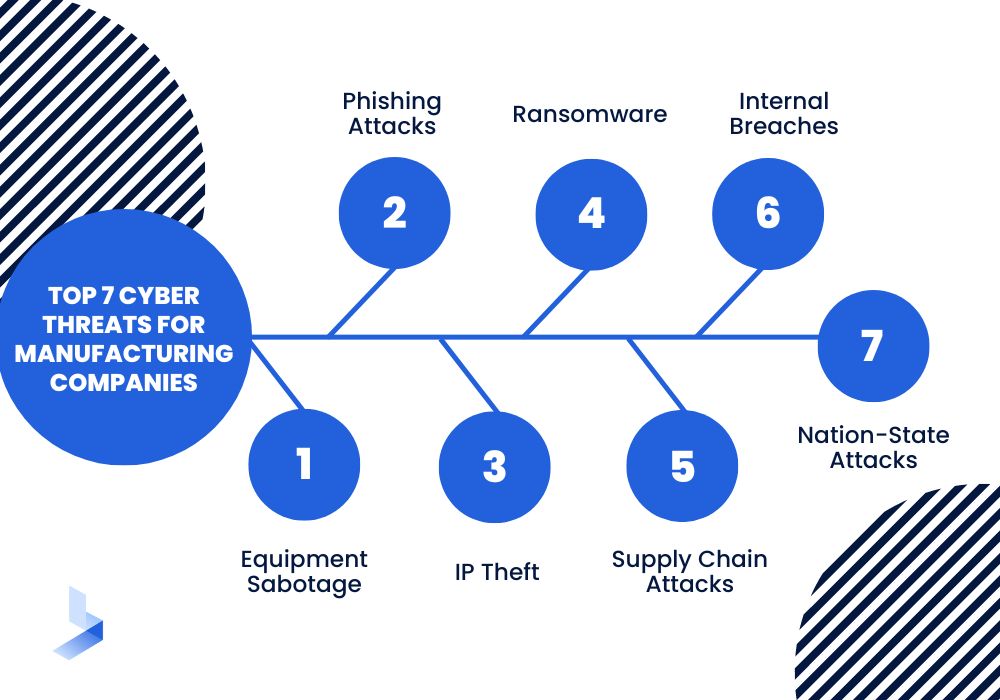For many manufacturing companies, the biggest cyber threat is a lack of knowledge and training. All too often, management isn’t even fully aware of the risks, and most employees have little to no training regarding how to identify and avoid potential threats. Learning the top cyber threats for manufacturing companies is the first step toward building a cybersecurity solution to protect your business.

Phishing Attacks
Phishing is one of the oldest and most widely used tactics among cybercriminals. While most people are aware of the way phishing works, many don’t realize how advanced the methods have become. Within commercial enterprises, phishing emails most often appear to come from within the company or from an organization likely to do business with the company. These emails look official, have all the right logos, and with a simple click, can prompt employees to provide hackers with a discreet entry point into the network. Unfortunately, this is only where the danger begins. Once threat actors have access to the network of an organization, they can often move invisibly through the network until they gain access to information that will allow them to complete an attack.
As if the nature of these attacks wasn’t a big enough threat, there are also a variety of reasons that manufacturing companies are uniquely vulnerable to phishing attacks. Consider these ways manufacturing companies are more vulnerable to phishing attacks than other industries.
- Lack of preparation throughout the industry
- The use of systems never intended to be connected with the outside world
- A long supply chain with many interconnected companies
- Hackers can often access the names of management employees to impersonate
- Fragmented systems across different departments make it difficult to apply a single security framework
Ransomware
As threat actors moved away from the sale of sensitive and financial information as a primary reason for cybercrime, the value of ransomware became evident. Unfortunately, manufacturing companies have much to lose from such an attack. Ransomware is a type of malware that encrypts files on a network and makes them unusable until the demands of hackers are met. These threat actors may threaten to sell or leak sensitive data if a ransom (often millions) is not paid. Another way ransomware users attack manufacturing companies is they make the network unusable to the company until the ransom is paid. This tactic is very effective within the manufacturing sector because downtime puts such a strain on manufacturing companies.
Ransomware attacks often occur on weekends or holidays to allow threat actors to complete as much damage as possible before the attack is realized. This allows hackers to be waiting comfortably when the attack is realized during a busy time for manufacturing organizations. The reasons that manufacturing companies are such an attractive target are many. A vast network of OT devices throughout a long supply chain provides multiple endpoint vulnerabilities, and fragmented systems leave gaps in security.
However, even beyond the potential vulnerabilities, manufacturing companies provide hackers with optimal reasons to target them for a hefty ransom. For manufacturing companies, time is money. To that end, downtime is particularly expensive. Even when ransomware actors demand exorbitant amounts of money, it’s often more cost-effective for manufacturing companies to pay up. Unfortunately, downtime may not be the biggest worry for the manufacturing sector. With long supply chains depending on parts or products, other companies and industries can become affected by the disruption within days. This impact can be devastating to the original victim company as business relationships are lost and customers learn of the breach. All too often, manufacturing companies reveal little or no information about ransomware attacks in hopes to salvage their professional reputation.